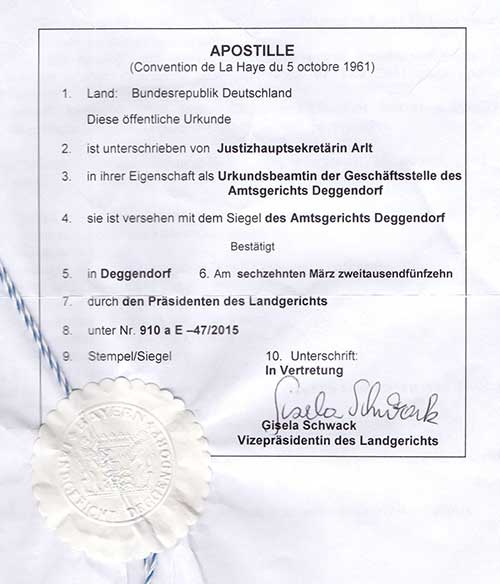

Schmidt & Schmidt covers the full spectrum of legalization services for documents issued in Germany.
Germany joined the Hague Convention on the Simplified Authentication of Documents on 15 December 1965; the Convention entered into force on 13 February 1966.
The apostille, or the “Hague apostille” is a certificate that authenticates the origin of a public document (e.g., a birth, marriage or death certificate, a judgment, an extract of a register or a notarial attestation). It confirms the authenticity of the signature and the authority of an official who signed the public document.
Documents issued in Germany and certified with an apostille in accordance with the Hague Convention of 1961 are recognised in all Member States of the Hague Convention and do not require any other form of certification, such as consular legalization, which considerably reduces the costs and time required for the certification of documents. So far, more than 120 states have joined the Convention.
The apostille is not sufficient for use in the states that are not party to the Hague Convention. In this case, consular legalization applies to a public document.
For some countries, there are special regulations because Germany has objected to their accession to the Convention. Consular legalization of the documents is usually necessary for Azerbaijan, Dominican Republic, India, Kyrgyzstan, Kosovo, Liberia, Moldova, Mongolia, Morocco, Moldova, Pakistan, the Philippines, Senegal, Tajikistan, Tunisia, and Uzbekistan.
German civil status documents and certificates of no impediment for marriage issued in accordance with the CIEC Convention following the International multilingual model are exempt from legalization in any form. More.
In Germany, different authorities are responsible for issuing the apostille, depending on which authority issued the document. The Federal Agency for Foreign Affairs is responsible for federal documents. An exception are documents issued by the Federal Patent Court or the German Patent and Trademark Office and for which the President of the German Patent and Trademark Office is responsible. In the case of a federal state document, the responsibilities are regulated differently depending on the federal state.
The apostille in Germany is a square stamp in German with the obligatory heading "Apostille" and a reference to the 1961 Hague Convention in French (Convention de La Haye du 5 octobre 1961). The apostille certificate’s sides will be at least 9 centimeters long.

There is no one designated apostille authority for all Germany-issued public documents.
The apostille process can vary and consist of several pre-certification steps. The processing time often depend on the workload the apostille authorities are. Therefore, some documents will take longer than others to be certified.
In Germany, only original documents are allowed to be apostilled. Electronic documents or electronic signatures will not be recognized in Germany.
A public document must be in good condition and all seals and signatures must be clearly legible.
In some cases, a public document must current (not be older than 3 or 6 months) to be apostilled.
If you require new original documents, the information here will help you.Educational documents issued in Germany, such as school reports, university degree certificates, transcripts of records, enrollment certificates and other certificates from schools or universities are not effective abroad until they are certified with an apostille. For example, an apostille for your foreign degree may be required to apply for a Master's or a PhD degree program.
In Germany, there are several organisations responsible for affixing the apostille to educational documents. The authority to apply the apostille varies depending on the federal state in which the university is located.
The authorities of each federal state in Germany formulate their own rules for the authentication of educational certificates. In some federal states, the original document can be certified directly with the apostille, in others, the original document must first be certified by certain state authorities. Processing times are different and depend on the respective procedure. If pre-certification of the proof of education is required, the legalization time is extended.
Germany has concluded bilateral agreements with Austria, Belgium, Denmark, France, Greece, Italy, Luxembourg, and Switzerland, according to which certain documents are exempt from any certification if they are sealed by the responsible administrative authorities.
Civil status certificates and certificates of marriageability, which are issued by one of the contracting states according to the model of the Convention of the International Commission (CIEC Convention) for Civil and Civil Status Affairs (CIEC), are exempt from any formality in Germany.
Contracting states of the Vienna CIEC Convention of 08.09.1976 (issuance of multilingual extracts from civil status registers: birth, marriage, and death certificate) are:
Contracting states of the Munich CIEC Convention of 05.09.1980 (issuance of multilingual certificates of marriageability) are:
Furthermore, Regulation (EU) 2016/1191 of 6 July 2016 on public documents simplifies the circulation of certain public documents that must be presented in an EU Member State and have been issued in another EU Member State, thus exempting public documents from the confirmation of authenticity with the Apostille with the aim of reducing administrative burden and costs for citizens.
Should a German document be used in a country that does not recognize the Hague Convention, such as Thailand, Egypt, the United Arab Emirates or other countries not listed as a contracting party, the procedure of consular legalization, also called “embassy attestation”, applies. For a complete list of countries that accept and use apostilles, click here.
Consular legalization is the process of authenticating or certifying a legal document so a foreign country's legal system will recognize it as with full legal effect that is carried out by the diplomatic or consular mission of the country in which the document is to be used.
Consular legalization is more complex, time-consuming and costly than the simpler apostille procedure. Whereas apostille is usually issued within one step, consular legalization requires several pre-certifications before a public document can be certified at the embassy or consulate of the destination country in Germany.
It is a common requirement that the document has to be translated into the official language of the destination country before submission to the embassy. It is up to the diplomatic mission to decide about the authentication procedure.
The common feature between apostille and consular legalization is that they authenticate an official document for presentation to institutions in another country. However, they have many differences.
| Apostille | Consular legalization | |
|---|---|---|
| Legal effect | Can be used in all countries that are party to the Hague Convention on the Simplified Legalization of Documents. | Use between States one or both of which is not a member of the Hague Convention, or where one of the contracting States has protested the accession of the other. |
| Difficulty | Moderate. To obtain an apostille, contact the competent apostille authority of the state of origin of the document. | High. For consular legalization, various inland authorities and a diplomatic mission of the state of destination must be involved. |
| Pre-certification | Usually not required. | Is obligatory. |
| Attestation at the state of destination embassy in the state of origin of the document | No need to contact the Consulate of the country of destination. | Is the final step of legalization. |
We offer apostille and consular legalization services for the public documents originating from all 16 federal states of Germany.
In each federal state, the apostille and therefore pre-certification procedure have their own specifics. Depending on the type of document and the issuing authority, different state bodies are designated to issue the apostille.
If the important documents are lost or damaged, or current copies of the documents are needed, the re-issue of the documents is required. It is not unusual for people outside Germany to encounter difficulties with obtaining new documents when abroad. Our consultants will help you procure new documents from Germany remotely, and we can arrange for your documents to be sent by courier anywhere in the world.
Copies and transcripts of civil status documents can be translated into any language by a sworn translator in Germany or the translation can be done in the country of destination. We offer certified translations of civil status documents with further certification. The cost of the work is calculated according to the volume of the document in question.
Any foreign document issued in one country and used in another country must be legalized for use abroad. Therefore, the authenticity of a certified translation from Germany needs to be certified by an apostille. Consequently, many authorities may not accept certified translations from Germany if the translation has not been properly authenticated in Germany for use abroad. To avoid this confusion, translations should better be made in the state of destination of the document.
We offer a wide range of services and supplies related to the legalization of documents to suit all your needs. If you have a tight budget or need to have your documents legalized in record time, we can find a suitable solution. The deadline begins with the receipt of your documents.
incl. German VAT 19%
Price excl. VAT from 120€
Apostille and consular legalization for document from abroad
incl. German VAT 19%
Price excl. VAT from 140€
Certified translation of documents into foreign language
incl. German VAT 19%
Price excl. VAT from 60€
Express delivery of documents with apostille from abroad is charged separately according to the rates of delivery services.

Send us a request with a copy of your documents by email or via a special form on the website. We will examine your documents and let you know whether legalization is possible, as well as information on the costs and conditions of the procedure. We will need some time to complete the initial review. We will contact you as soon as we have all the necessary information.

It is not necessary to make an appointment or visit our office. Simply send us your documents by courier service and pay the amount due online. If necessary, we are always ready to answer further questions by e-mail or telephone.

The legalization of documents will take some time. Our experts work quickly and efficiently because they know their stuff well. As soon as the documents are ready, we will inform you.

As soon as the documents are legalized, we will send them to you by courier service worldwide. Our company also offers you translation services.
Kanada ve Hollanda'dan birçok resmi belge için noter ve apostil onaylarını Schmidt & Schmidt aracılığıyla aldik. Bilgesu Hanim işini çok iyi yapıyor. Her sorumuza vakit ayırıp detaylı cevap verdi. Tüm aşamaları takip etti ve bizimle irtibat halindeydi. İşlemler çok hızlı bir sekilde sorunsuz tamamlandı. Yardımlarınız için çok teşekkürler.
04 September 2024I really enjoy the service. It was easy to agree on all details online. I received all the documents translated and registered within a month. Thanks
26 August 2024 great professionals!What is an apostille? Why do I need an apostille? How do I get an apostille? - Our video will explain everything you need to know about the apostille. If you have a document that needs to be certified with an apostille for use abroad, Schmidt and Schmidt will assist you! We provide apostille services in more than 100 countries worldwide.
Legalization of a document is a process, which allows to legitimate the document issued in one country for its usage in another. It means, if you want to submit a document, issued in one country, to authorities in a target country, the document must primarily prove its authenticity. Legalization confirms the authority of the issuing official as well as an authenticity of his signature and seal. Legalization is needed for official non-commercial documents.
No, not always. In some cases, countries can make bi- or multilateral agreements that completely revoke legalization of documents for their recognition in the member countries. For example, a CIEC convention from 1976 or bilateral treaties between Germany and Belgium, Denmark, France, Greece, Italy, Luxemburg, Austria and Switzerland.


When foreign documents have to be presented to local authorities, a certified translation is required. These documents therefore must be translated and signed by a sworn translator and then certified by a notary, court or any other authority.
We work with qualified sworn translators and offer you certified translations of various documents such as contracts, extracts from commercial registers, court decisions and certificates into various languages.
The certified translations we offer will be recognized in more than 100 countries.

It often happens that personal documents are lost or damaged. Current copies of these documents are also sometimes required. In this case it is necessary to obtain documents again. Our service allows you to obtain documents remotely in more than 100 countries around the world. We can also legalize documents and deliver them by courier anywhere in the world.
Duplicate birth, marriage, name change, divorce or death certificates may be required to register a marriage abroad, register a newborn child, obtain citizenship or inheritance, data to apply for a pension confirm opening bank accounts and handling other bureaucratic matters.
We ensure that our services are legally flawless and your documents will be accepted in the target country.
We include the cost of our services, government fees, and delivery in the price. You don't need to worry about additional expenses. Obtain an apostille or consular legalization of your documents without registration or subscription.
Stay informed on our latest news.

Pakistan's Foreign Ministry held a ceremony to mark the Islamic Republic's accession to the 1961 Hague Convention Abolishing the Requirement of Legalization for Foreign Public Documents (Apostille Convention), Radio Pakistan reported.
23 August 2024 
The Irish government has drafted legislation that will replace the current Limited Liability Partnership Act 1907 and the Registration of Business Names Act 1963 when it comes into force. It will expand the registrar's powers and introduce additional reporting and disclosure requirements, Irish Legal News reports.
15 August 2024 
The authorities of the People's Republic of Bangladesh officially deposited their instruments of accession to the Convention of 5 October 1961 for the Abolition of the Requirement of Legalization for Foreign Public Documents, also known as the Apostille Convention, with the Hague Conference on Private International Law (HCCH) on July 29, 2024. The official website of the Hague Conference reports this.
31 July 2024 
Three-quarters of national jurisdictions surveyed by the Financial Action Task Force on Money Laundering (FATF) are partially or completely non-compliant with anti-money laundering guidelines for regulating virtual assets. This is stated in the Group's report.